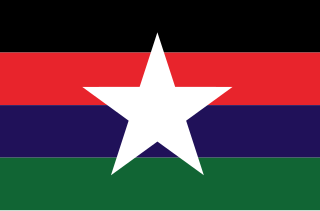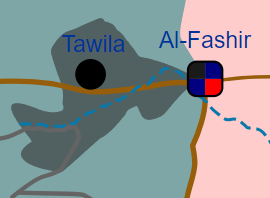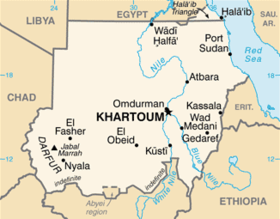
Darfur is a region of western Sudan. Dār is an Arabic word meaning "home [of]" – the region was named Dardaju while ruled by the Daju, who migrated from Meroë c. 350 AD, and it was renamed Dartunjur when the Tunjur ruled the area. Darfur was an independent sultanate for several hundred years until 1874, when it fell to the Sudanese warlord Rabih az-Zubayr. The region was later invaded and incorporated into Sudan by Anglo-Egyptian forces in 1916. As an administrative region, Darfur is divided into five federal states: Central Darfur, East Darfur, North Darfur, South Darfur and West Darfur. Because of the War in Darfur between Sudanese government forces and the indigenous population, the region has been in a state of humanitarian emergency and genocide since 2003. The factors include religious and ethnic rivalry, and the rivalry between farmers and herders.
The Janjaweed are a Sudanese Arab militia group that operates in Sudan, particularly in Darfur, and eastern Chad. They have also been speculated to be active in Yemen. According to the United Nations definition, Janjaweed membership consists of Sudanese Arab tribes, the core of whom are from the Abbala Arabs, traditionally employed in camel herding, with significant recruitment from the Baggara, who are traditionally employed in cattle herding.
The Kujargé language is spoken in seven villages in eastern Chad near Jebel Mirra, and in villages scattered along the lower Wadi Salih and Wadi Azum in Darfur, Sudan. It is estimated to have about 1000 speakers.

Geneina is a city in West Darfur, part of the dar Masalit region, in Sudan. It joined British Sudan at the end of 1919 through the Gilani agreement, signed between the Masalit Sultanate and the United Kingdom, according to which it became a territory.

The Sudan Liberation Movement/Army is a Sudanese rebel group active in Darfur, Sudan. It was founded as the Darfur Liberation Front by members of three indigenous ethnic groups in Darfur: the Fur, the Zaghawa, and the Masalit, among whom were the leaders Abdul Wahid al Nur of the Fur and Minni Minnawi of the Zaghawa.

The African Union Mission in Sudan (AMIS) was an African Union (AU) peacekeeping force operating primarily in the country's western region of Darfur to perform peacekeeping operations related to the Darfur conflict. It was founded in 2004, with a force of 150 troops. By mid-2005, its numbers were increased to about 7,000. Under United Nations Security Council Resolution 1564, AMIS was to "closely and continuously liaise and coordinate ... at all levels" its work with the United Nations Mission in Sudan (UNMIS). AMIS was the only external military force in Sudan's Darfur region until UNAMID was established. It was not able to effectively contain the violence in Darfur. A more sizable, better equipped UN peacekeeping force was originally proposed for September 2006, but due to Sudanese government opposition, it was not implemented at that time. AMIS' mandate was extended repeatedly throughout 2006, while the situation in Darfur continued to escalate, until AMIS was replaced by UNAMID on 31 December 2007.

Throughout its history, Darfur has been the home to several cultures and kingdoms, like the mythical Tora or the Daju and Tunjur kingdoms. The recorded history of Darfur begins in the seventeenth century, with the foundation of the Fur Sultanate by the Keira dynasty. In 1875, the Anglo-Egyptian Co-dominion in Khartoum ended the dynasty. The British allowed Darfur a measure of autonomy until formal annexation in 1916. However, the region remained underdeveloped through the period of colonial rule and after independence in 1956. The majority of national resources were directed toward the riverine Arabs clustered along the Nile near Khartoum. This pattern of structural inequality and overly underdevelopment resulted in increasing restiveness among Darfuris. The influence of regional geopolitics and war by proxy, coupled with economic hardship and environmental degradation, from soon after independence led to sporadic armed resistance from the mid-1980s. The continued violence culminated in an armed resistance movement around 2003.
The Daju people are a group of seven distinct ethnicities speaking related languages living on both sides of the Chad-Sudan border and in the Nuba Mountains. Separated by distance and speaking different languages, at present, they generally have little cultural affinity to each other.
The Dar Fur Daju are an ethnic group in the Sudan. They are one of seven distinct ethnicities comprising the Daju people. They speak the Nyala language. They live in Southern Darfur in the Sudan in the Daju Hills 40 km northeast of Nyala - although most of this population has fled to Chad as a result of the Darfur Conflict. There is also a small population of Dar Fur Daju near the city of Lagowa in the Nuba Hills. Their total population numbers 98,000 (2017). They are mostly Muslim.
The Kujarke people are a little-known ethnic group of the Ouaddaï Region in eastern Chad and South Darfur, Sudan. They speak Kujargé, a divergent, unclassified Chadic language. Their current population and locations are unknown due to the war in Darfur. Furthermore, they have not been previously recorded as a separate ethnic group by any government or foreign aid organization.

A war between the Sudanese Armed Forces (SAF) and the paramilitary Rapid Support Forces (RSF), rival factions of the military government of Sudan, began on 15 April 2023, with the fighting concentrated around the capital city of Khartoum and the Darfur region. As of 15 August 2023, between 4,000 and 10,000 people had been killed and 6,000 to 12,000 others injured, while as of 24 October 2023, over 4.6 million were internally displaced and more than 1.2 million others had fled the country as refugees. The war began with attacks by the RSF on government sites as airstrikes, artillery, and gunfire were reported across Sudan. Throughout the conflict, RSF leader Mohamed Hamdan "Hemedti" Dagalo and Sudan's de facto leader and army chief Abdel Fattah al-Burhan have disputed control of government sites in Khartoum, including the general military headquarters, the Presidential Palace, Khartoum International Airport, Burhan's official residence, and the SNBC headquarters, as well as states and towns in Darfur and Kordofan. The two sides were then joined by rebel groups who had previously fought against the two sides. Starting in June, the SPLM-N (al-Hilu) attacked army positions in the south of the country. In July, a faction of the Sudan Liberation Movement led by Mustafa Tambour (SLM-T) officially joined the war in support of the SAF, while in August, the rebel Tamazuj movement based in Darfur and Kordofan joined forces with the RSF.

The Battle of Geneina, also known as the Geneina massacre, was a battle for control of Geneina, the capital of West Darfur in Sudan, between the paramilitary Rapid Support Forces (RSF) and the Sudanese Armed Forces (SAF). By 25 April 2023, fighting intensified and devolved along tribal lines, with Masalit and non-Arab peoples supporting the SAF and the aligned Joint Darfur Force—consisting of former rebel groups including the Sudan Liberation Movement/Army and the Justice and Equality Movement—against the RSF and allied Arab militias.

The Darfur campaign or Darfur offensive is a theatre of operation in the 2023 war in Sudan that affects five states in Darfur: South Darfur, East Darfur, North Darfur, Central Darfur and West Darfur. The offensive mainly started on 15 April 2023 in West Darfur where the RSF forces captured Geneina, the conflict came after several days of high tensions between the forces and the government.
The following is a timeline of the War in Sudan (2023).
The Battle of Nyala was a battle for control of Nyala, the capital of South Darfur in Sudan, between the paramilitary Rapid Support Forces (RSF), and the Sudanese Armed Forces during the ongoing Darfur campaign. The first battle occurred between 15 and 20 April 2023, during which hundreds were reported dead. A civilian-brokered ceasefire paused the fighting by April 20. Sporadic clashes broke out between May and July. In August 2023, the RSF launched an offensive on the city. The SAF launched air campaigns against the RSF in Nyala, with many civilian casualties in Taiba and El Matar. In late September, the RSF besieged the headquarters the SAF's 16th Infantry Division headquarters, capturing it on October 26.
The humanitarian crisis following the 2023 Sudan conflict was further exacerbated by the violence occurring during a period of high temperatures, drought and the conflict starting during the latter part of the fasting month of Ramadan. Most residents were unable to venture outside of their homes to obtain food and supplies for fear of getting caught in the crossfire. A doctors' group said that hospitals remained understaffed and were running low on supplies as wounded people streamed in. The World Health Organization recorded around 26 attacks on healthcare facilities, some of which resulted in casualties among medical workers and civilians. The Sudanese Doctors' Union said more than two-thirds of hospitals in conflict areas were out of service with 32 forcibly evacuated by soldiers or caught in the crossfire. The United Nations reported that shortages of basic goods, such as food, water, medicines and fuel have become "extremely acute". The delivery of badly-needed remittances from overseas migrant workers was also halted after Western Union announced it was closing all operations in Sudan until further notice. The World Food Programme said that more than $13 million worth of food aid destined for Sudan had been looted since the fighting broke out. An estimated 25 million people, equivalent to more than half of Sudan’s population, were said to be in need of aid.

The Battle of El Fasher is an ongoing battle for control of the town of El Fasher in North Darfur during the 2023 Sudan conflict. The first battle for the city took place between April 15 and April 20, and resulted in a ceasefire that held until May 12. Clashes broke out again between May 12 and 29, and ended with a more stable ceasefire that lasted until August. By September, the city had become a haven for refugees across the region, and was also suffering from food and water shortages.

Khamis Abdullah Abakar also known as Abdallah Abakar was a Sudanese politician, activist and former army commander who served as the Governor of West Darfur from 2021 to 2023.
Sirba is a town in West Darfur, Sudan. It lies approximately 23 kilometres (14 mi) north of El Geneina, which is the capital of West Darfur. The town has been subjected to attacks and violence by the Rapid Support Forces (RSF) and allied gunmen during the ongoing conflict in the region.
The Darfur Joint Protection Force, or more simply the Joint Darfur Force/Joint Force, is a neutral peacekeeping force that was set up during the Battle of El Fasher to protect civilians during the War in Sudan (2023). It was formed on 27 April 2023 by four former rebel groups and signatures of the Juba peace agreement. The participating groups are SLM-Minawi, the Justice and Equality Movement, the Sudanese Alliance, and the Gathering of Sudan Liberation Forces. It is currently lead by Darfur Region Governor Minni Minawi.












